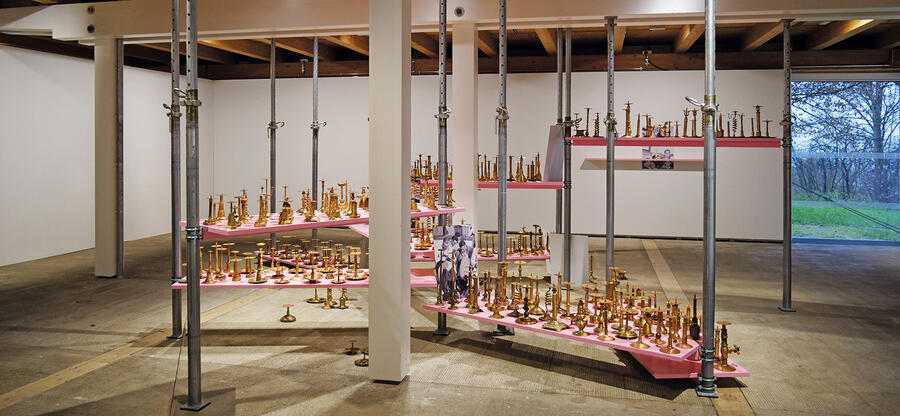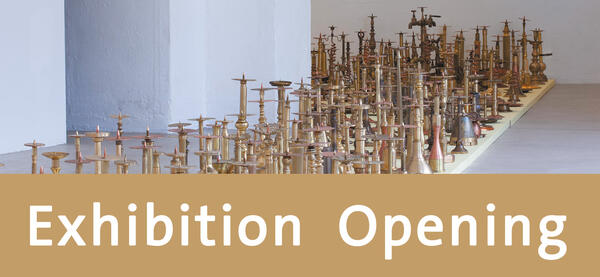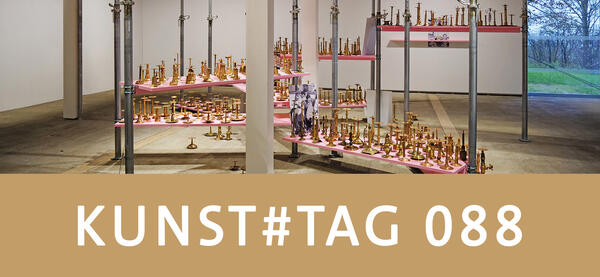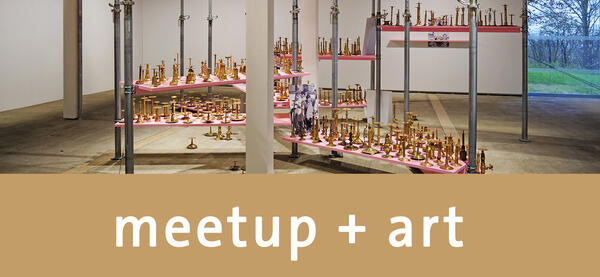Focus Freising 2: Rebekka Bauer
Date :
10.12.2022 until 05.02.2023
Focus Freising 2 | Rebekka Bauer: Die Aufstellung (The Compilation)
Dates
10 December ‒ 05 February 2023: Exhibition
Tuesday ‒ Saturday, 2 ‒ 6 pm; Sunday and holidays, 10 am ‒ 6 pm
- The exhibition spaces and Café Botanika are wheelchair accessible.
- The exhibition and accompanying programs are admission free.
About the exhibition
The installation Die Aufstellung (The Compilation) by Rebekka Bauer addresses the legacy of the traumas of World War 2 in the home of a German family. The artist's work takes as its starting point an archive of 550 metal objects that her grandfather, a former member of the Wehrmacht, created over several decades in the basement of their shared home in Freising, Germany. The objects, hundreds of candleholders assembled in a whimsical array of turned metals and everyday objects such as faucets or metal springs, become bearers of trauma within the artisanal practice.
To show the impact of untold wartime experiences on everyday family life, the metal objects are contrasted with both images of the war and family photographs that show snippets of the family's daily life up to the early 2000s. The exhibition is complemented by an art book in which the disparate photographic material is juxtaposed. The quiet and unobtrusive relaying of trauma is echoed in the browsing, and repetition of the objects.
The exhibition is supported by the Cultural Fund of the City of Freising.
Prologue:
A piece of linoleum laid diagonally in the corridor of the basement leads to a door on the left at the far end of the corridor. The door opens into a room with a workbench under a small, barred window. Fruit crates on the floor are jammed all the way to the center of the room, and contain various assorted metal objects: Threaded brass and zinc rods, copper heating coils, faucets and handle fixtures labeled HOT, COLD, and warm, green valve handles, hexagonal copper tubing, round metal sleeves and cones, iron rods, gasket rings and gasket screws, metal lampshades, brass lamp stands, nuts, shovels, screws, pegs, brass bells and bowls, tarnished tin cups, metal pipes, several copper kettles and pans, cast iron coal irons with wooden handles, and individual parts of copper bed warmers covered in verdigris. The workbench is more like a shelf than a work surface and holds, among other things, the following items: Small, round, sharp-edged copper plates, a heavy iron hammer, rusted, battered screw clamps, various screwdrivers, and in the center a large iron vice with an anvil, roughly sharpened pencils, small metal brushes, pliers, a Bunsen burner, a wine bottle with linseed oil, as well as some metal chain links and brass rods in various lengths. Next to the workbench, on a small table, is a drawer containing files and pliers of all sizes. The tools appear to have never been new and have numerous scratches and rust marks. Metal objects are lined up on shelves against the wall, shining brightly even in the gloom of the basement.
About the artist:
Rebekka Bauer (born 1991 in Freising, lives in Leipzig) is an artist, curator, author, and stage designer. She studied media art with Clemens von Wedemeyer at the Academy of Visual Arts Leipzig and stage design at the Mozarteum Salzburg and the Academy of Fine Arts Vienna. In her work, she uses biographies and everyday realities to question processes of subjective and collective historiography. In her re-arrangements of photographic archives, objects, and everyday items, she references cinematic and literary modes of storytelling through various methods of montage. Collective and dialogue-based work is an important part of her practice. She often works with other artists, most recently with Lucia Graf for the collaborative piece "Room with a sink," in which she uses protagonists A and B to negotiate the notions of touch, communication, and intimacy. She is a member of the curatorial collective of the Kunstverein Leipzig.
For "The Compilation" (Die Aufstellung), she received a project grant from the Cultural Foundation of Saxony in 2022, as well as a grant from the VG Bildkunst in 2021. "The Compilation" (Die Aufstellung) is on this year's shortlist of the Fotohof Salzburg (Fotohof calling) and was nominated at "It's a book" (Student's selection) in 2021.
Links:
Fotohof calling: https://calling.fotohof.at/edition/calling-2022/
Student's Selection https://www.itsabook.de/students-projects
Kunstverein Leipzig: https://kunstverein-leipzig.org/
More information about the artist: www.rebekkabauer.de





